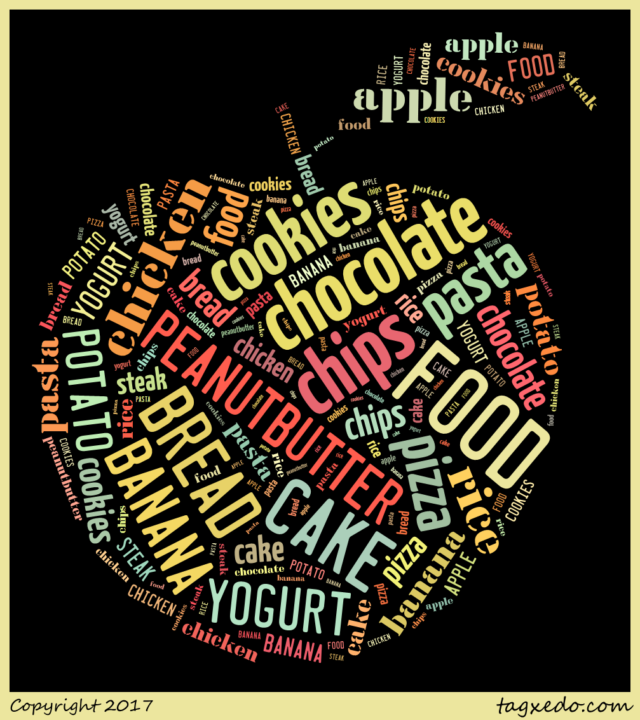Addict sounds a little harsh, doesn’t it?
You may not like the word, but the truth is: FOOD ADDICTION is a thing.
And I believe it’s a pretty common thing. A REALLY common thing in fact.
Think about it…
Food is everywhere: It’s easily and constantly accessible, relatively inexpensive (especially the crap), and it’s socially acceptable (we need to eat, right?).
Compared to smoking, drugs, alcohol, and sex, food is the easiest thing to be addicted to.
And food offers the solace that all other addictions offer: It helps to soothe or suppress some sort of emotional pain, anxiety, or stress that you don’t feel you can deal with.
In fact, I’ve used food myself… to avoid difficult emotions, to procrastinate, and to soothe myself at the end of a tough day.
How does food make you feel better?
Chemically, food actually gives you a “hit” by releasing all these natural hormones (or neurotransmitters) into your body:
Serotonin: This hormone comforts and calms you, it helps dial down your anxiety.
Dopamine: This is the reward hormone, it makes you feel that “rush” of excitement.
Oxytocin: You know this one if you’ve ever had a baby. It’s the bonding hormone that makes you feel connected to others.
Opioids and endocannabinoids: These two are your natural painkillers.
The amazing thing is that these hormones aren’t only released in relation to the type of food you’re eating, but they also get released when you chew and even when you’re just thinking of eating.
There are, though, certain types of food that cause more hormone to be released, and are therefore more addictive.
Like processed and sugary foods, for instance.
Sweet and starchy foods and drinks can give you a serotonin rush, especially if they’re processed (in fact processed foods were designed for this).
When foods are processed it means they’re broken down from their original form. They’re kind of “pre-digested”.
And because a lot of the digesting work is already done for you, processed food more readily and quickly gets absorbed into the body, And therefore serotonin is more readily and quickly released.
Instant calm.
But not for long!
When it wears off, you’ll crave more of it.
And then more.
And more.
But things begin even before the food even enters your mouth.
Just thinking about food and eating causes dopamine to be released, and all of sudden you feel kind of excited!
Yay! Food is on the way!
Maybe you’ve even noticed yourself salivate when you’re just thinking about eating. It’s amazing when you realize that your thoughts actually create these physical responses in the body.
Then, when you dig in and begin chewing and digesting your food, you’ll feel comforted.
This is where the oxytocin is released, and you feel something warm, like love, come over you.
It’ll make you feel like life is good, you’re safe, and you don’t need to worry, because food is taking care of you.
As you can see, food gives you a whole lot more than just energy for your cells.
So, how do you know if you may be addicted to food?
Well, there are a few signs that may tip you off:
- You spend a lot of time planning, concealing, thinking about, and buying food.
- You’ve tried many diets , and most haven’t succeeded.
- You frequently eat when you’re not hungry
- You often eat more than you’d like, even past feeling full.
- You regret how much you ate afterwards.
- You continue to use food or food restriction to soothe yourself even though it’s affecting your relationships, your work, and your self-esteem.
A food addiction, like a drug or alcohol addiction, is a survival mechanism. It’s actually a way of trying to help yourself get through a tough time, or deal with stress and difficult emotions in your life.
And notice that BEING OVERWEIGHT is not necessarily a sign of a food addiction. There are plenty of “normal” weight people who are addicted too.
And when food addiction goes the other way, being under-weight becomes an issue. And this addiction to RESTRICTING FOOD can lead to serious conditions such as anorexia or bulimia.
But whether over-eating or food-restricting, these disordered relationships with food usually stem from wanting to avoid or alleviate pain.
So if you think you’re addicted, what can you do about it?
It is possible to get over this addiction, and below I’m outlining 5 ways that I believe can help you get there…
1. GET HELP
Find a support group, like Overeaters Anonymous, or a therapist who specializes in food addiction.
Just like any addiction, there are likely deep, underlying reasons why you’ve gone down this path. So finding others who can help you navigate it, will likely get you feeling better sooner.
2. DON’T ISOLATE yourself
Being addicted to food is not uncommon. In fact it’s probably the most common way we self-medicate to avoid feelings we don’t want to face. You are not alone.
Confide in someone you trust and share what you’re going through. You may just be surprised to discover that they also have similar issues with food.
3. Restrict SOCIAL MEDIA
We can see into other people’s lives more than ever before. But what we see of their lives posted on Facebook or Instagram, for instance, is not REAL life. These are chosen moments.
REAL life is messy. It’s made up of the whole spectrum of wonderful to unimaginably tough times.
We all have bad days, sad days, and mad days. But those uglier days don’t usually make the cut on social pages.
As a result, we may be lulled into believing that everyone else’s life is so much better than our own.
And that leads to useless pain, and increases the chance of addiction.
4. MOVE
Just like food, exercise releases many of the same awesome, feel-good hormones.
Basically, you can get the same “high” from a brisk walk outdoors that you do from a Snickers… without the side-effects.
So try getting out there and moving, or better yet, find someone to move with. Recruit a walking or running buddy, discover a class you like, or hire a coach or trainer.
Getting support in the form of another human being will help you feel supported and motivate you to continue taking steps forward.
5. Learn to TRUST YOUR BODY
Weight, calories, and inches are out.
Relying on NUMBERS means that you’re NOT TRUSTING YOUR BODY.
Your body is the most amazing, fine-tuned instrument that the world has ever seen. It knows what it needs and it lets you know what those things are, if you pay attention.
So, instead of measuring things, try feeling things.
Feel what it’s like to be hungry and feel what it’s like to be full.
Feel what’s going on emotionally when you choose to eat the foods you want to stop eating.
Feel what different foods do to your body: Do they energize you or do they make you feel slugglish?
Keep a journal and follow yourself around, documenting all these feelings. You may just learn to appreciate and trust the awesomeness of your body.
In fact, I’m including an Emotional Eating Journal FREEBIE that Precision Nutrition has created to help you get this done. It’s not about documenting your calories or quantities though… instead its about discovering what’s going on within you in relation to food.
Becoming consciously aware of why you’re eating can be transformative.
Keep moving forward my friends,
Debbie
P.S. If you didn’t already, you can download the free PN Emotional Eating Journal right here!
P.P.S. Join me on my Facebook page on Monday, May 1st at noon for my Facebook live video where I’ll get a little deeper into this discussion of food addiction and emotional eating…
And I’d love to know what your experience has been around food addiction…. Write a comment below, or on my Facebook page on Monday, below my video.
See you then!


